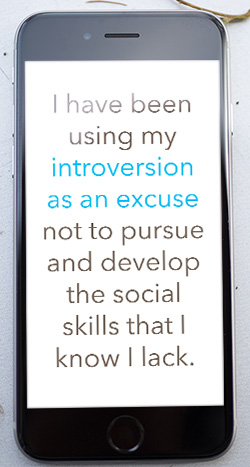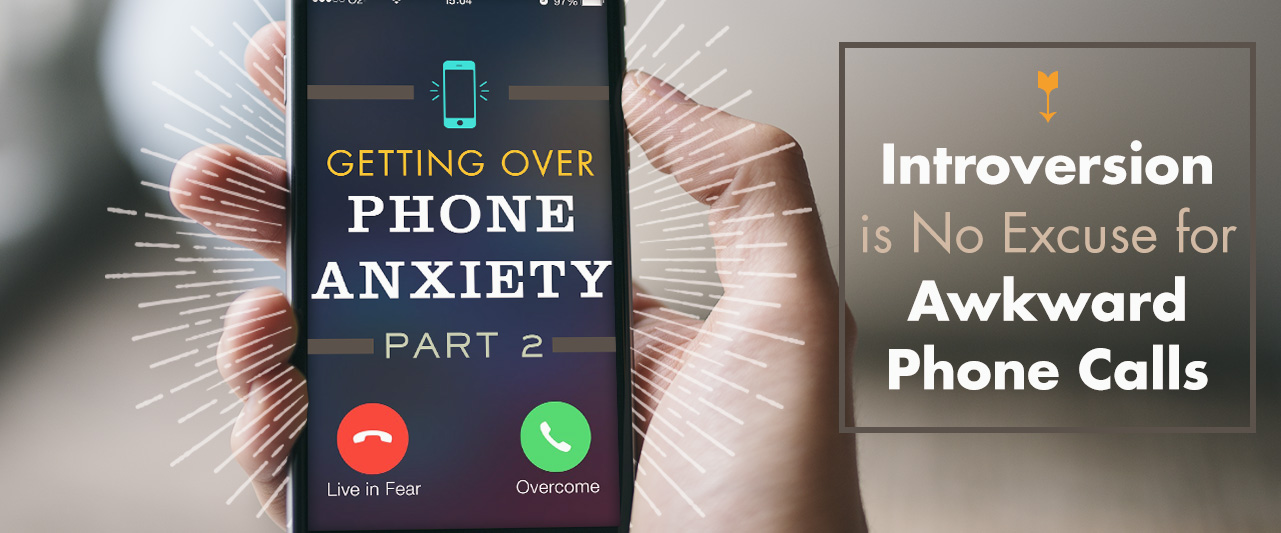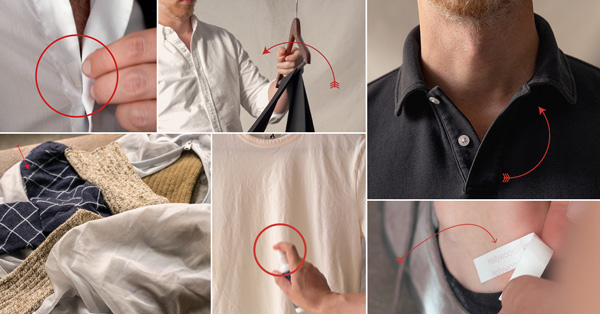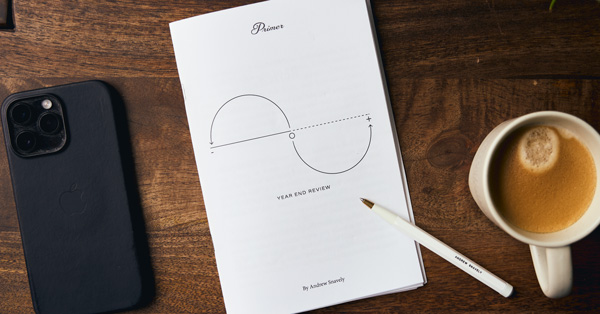This is Part 2 in our series on destroying your phone phobia.
➳ Part 1: Why It’s Time to Stop Being an Email Person and Start Being a Phone Person
➳ Part 2: Introversion is No Excuse for Awkward Phone Calls
➳ Part 3: The Millennial’s Guide to Talking on the Phone – The 10 Essentials
In the world, there are phone people and there are email people. For most of my life, I’ve been the latter. Lately, I’ve begun worrying that being overly digital in my social and professional life isn’t working. Society across all generations is becoming more connected on a digital plane, so it might seem like digital communication is trending up, becoming the preferred method of contact across-the-board. For the small stuff, it is. Ordering pizzas, filing taxes, getting a divorce—there’s lots that you can do online now. But for the things that matter the most, the phone is still the best way to reach out to distant people.
In this series of articles, I’ve been trying to reconnect with the ability to communicate with other human beings over the phone. The phone truly is an amazing technology, and I’m not talking smartphones. I’m talking about the ability to hear someone’s voice, anyone’s voice, in your ear, immediately in real time, no matter if they are in the next room or in the next time zone. We have this amazing technology at our disposal that lets us share our thoughts, feelings, and ideas at insanely high bandwidths. But people like me hardly use it. And when I do, I don’t use it well.
As I discussed in part 1, my over-reliance on digital communication has created a void in my life. Email and text will only get you so far so fast, and I think I’ve taken the medium to the limit. I want to connect with people on a deeper level. So, I’m learning to get over my awkwardness on the phone.
When I first started this project, I thought all I needed was determination and exposure. I thought I could just have a bunch of random phone calls and catch up on all the lost time in one frenzied burst. It turns out that this is not the most efficient way to get better.
Thankfully, I ended up talking to Alexa Fischer as part of this project. And she helped me see that there is a better way.

Alexa on the phone is much like Alexa on camera. She radiates energy. She delivers her thoughts in a way that is genuine and unrehearsed, yet transcendent of everyday chitchat. She explains in well-arced stories, and I find myself caught up in her excitement. At times, she almost sings as she drives a point home.
I really like this about her.
I know she’s a trained actress, but I don’t feel like she’s acting when we talk. Rather, she strikes me as someone who has learned how to present her true feelings in a way that is immediate and inspirational.
Alexa has a name for that. She calls it a 1000 Watt Presence. It’s the ability to share the best version of yourself at all times. And amazingly, it’s something that can be taught. That’s what she does for a living now, through one-on-one coaching and online video courses.
I tell her I am excited to talk to her because, I confess, I am sort of terrible on the phone. I don’t know why I thought she wouldn’t notice.
“You were a little hesitant at the beginning of the call,” she tells me.
This is the part of our conversation where the discussion gets a bit meta. During a phone interview on how to be better on the phone, Alexa is giving me live notes on my performance.
I try to explain myself. I tell her that whenever I call someone, I feel like the first thing I should do is apologize. Sorry for interrupting your life. Sorry for wasting your time with my stupid question. Sorry for existing on the same planet as you and using up precious oxygen that would better serve society in the lungs of someone far more legitimate and effective than me.
And that’s my problem right there.
It turns out that I am far more in control of how people perceive me than I realized. If people feel put off and annoyed when I call them, it is probably because I am more or less telling them to feel that way. Not explicitly, of course, but in all the other ways that matter even more than the words I speak.
This is the single most important thing that I learned from Alexa, and it wasn’t even the answer I was looking for. At the beginning of the call, I was eager to get her to do a post-mortem on some of my most awkward phone calls. I wanted to go over my field notes from some of the worst calls I’ve had and get some pointers from her.
But instead of looking at that, she has me back up. She has me back way up, not just to the beginning of the phone call, but way, way before the phone call.
We start with my personality.
Introversion is No Excuse for Social Awkwardness
“I’m an introvert,” I tell her.
This is meant to explain why I am inherently bad on the phone. Talking to people just isn’t in my blood.
I expected that to be a good starting point, as if admitting this handicap might set the bar lower for me. But Alexa’s response surprised me.
“I’m an introvert,” she says. “For sure, I’m a very comfortable public speaker. I love teaching and I love people, but I’m not out there partying and socializing all the time because it drains me.”
I realize that I’ve forgotten what extroverted versus introverted really means. It’s not about whether or not you like people, it’s just about where you get your energy from. Like me, Alexa recharges with quiet, alone time and solitary creative pursuits. She operates in a small circle of friends and spends much of her time with her husband and two kids. But her passion calls her to venture out of that space every day.
“I’m pretty much a homebody,” she says. “People see my videos and they see me on TV and they think ‘Oh she must be so extroverted’ because I can talk to anybody. But it’s just a skill I have.”
Hearing her explain that makes me feel a bit sheepish. Of course it’s a skill. And acknowledging that puts me in my place. I have been using my introversion as an excuse not to pursue and develop the social skills that I know I lack. I’ve been operating under the assumption that I could get by without learning how to bridge that gap between me and people I’ve just met, or even people I’ve known for a long time but not as deeply as I’d like to.
I’ve been wrong. And this persistent feeling of disconnectedness I have is proof. I feel the void everyday.
“It’s the human condition to want to connect, and that’s not an introverted or extroverted thing” Alexa says. “You’re never going to get that sense of connection from your Facebook feed.”
Talking about this feels like a major step toward overcoming this void. And as Alexa explains, it is. I’ve begun the work of rewriting the internal script that subconsciously dictates how I present myself and ultimately, how others perceive me.
An aside
Introvert vs. Extrovert: What does it really mean?
Since the concept of introversion and extroversion has entered the realm of pop psychology awareness, it’s somewhat lost it’s meaning among the masses. We’ve come to equate introversion with social awkwardness and extroversion with charisma. But that’s not what those terms mean.
Introverts are not inherently bad at social skills, and extroverts are not inherently good at them. Rather, as Susan Cain, author of Quiet: The Power of Introverts in a World That Can't Stop Talking, explains, there is more of a yin and yang relationship between the two personality types. Shyness and speaking skills are not part of the equation.
In Cain’s TED Talk on the same topic, she explains:
Shyness is about fear of social judgment. Introversion is more about how do you respond to stimulation, including social stimulation. So extroverts really crave large amounts of stimulation, whereas introverts feel at their most alive and their most switched-on and their most capable when they're in quieter, more low-key environments.
So, really, it’s not about what you are capable of. It’s simply where you most easily find your flow. This doesn’t mean that introverts should resign themselves to working in solitary confinement. In fact, introverts are often called upon to be leaders. Cain says:
Now in fact, some of our transformative leaders in history have been introverts. I'll give you some examples. Eleanor Roosevelt, Rosa Parks, Gandhi—all these people described themselves as quiet and soft-spoken and even shy. And they all took the spotlight, even though every bone in their bodies was telling them not to. And this turns out to have a special power all its own, because people could feel that these leaders were at the helm not because they enjoyed directing others and not out of the pleasure of being looked at; they were there because they had no choice, because they were driven to do what they thought was right.
If you’re an introvert, and you’re filling the pull to bridge that void, don’t ignore it. You can learn to reach out and even become a leader. It might even be your calling.
Rewriting Your Internal Script
Think of a social interaction like a little performance.
In a production, the actor on the stage has an understanding of the character he is playing—be it Othello or Hamlet or Sylvester—and he brings it to life in his performance.
When you speak—be it to one person on the phone, a hundred people from a podium, or a million people over the airwaves—you bring your interpretation of who you are to life.
When you perform poorly outwardly, it’s usually because you haven't rehearsed the best version of yourself internally.
This is the concept of the internal script that Alexa hearkens back to several times in our conversation. Our internal script is the story that we tell about ourselves to ourselves.
For me, my story is that I am an introvert. Therefore, speaking to new people is difficult and unpleasant for me, and nothing can change that. It’s against my nature. Anyone who talks to me is going to encounter this inherently awkward person and they are going to be annoyed, underwhelmed or both.
Having this story in my head whenever I pick up the phone has a distinctive effect on the attitude I radiate. If the goal is a 1,000 Watt Presence, then I am a flickering CFL bulb, improperly installed on a dimmer switch (for those of you who don’t get that joke, you’re welcome for the free electrical safety tip).
As I mentioned, I have a tendency to lead off on an apologetic note. I used to think this was a good tactic. I thought it was good to warn people, like a doctor as he snaps on the rubber glove. “You may feel a little discomfort.”
As with the doctor, this is probably more detrimental than anything. The person picks up the phone and hears “I’m sorry” in my voice, and his or her attitude automatically shifts to meet the expectation I’ve set.
In this way, negative internal scripts are a nearly unstoppable force. When you have an expectation of how a social interaction will unfold, it’s pretty much impossible to hide it. As we know, emotions are contagious and we aren’t good enough actors to hide our true feelings. It’s even harder to hide it if you don’t know that you have that internal script. That’s the case for most of us. No one would consciously write himself a negative story about himself. Rather, the stories about who we are and how we expect the world to react to us are developed subconsciously in response to all the traumas, disappointments, embarrassments, and frustrations we’ve faced over the years.
In spite of that, there is good news. Rewriting that internal script is very easy to do. Most of the time, it’s simply a matter of identifying your default internal script, realizing that it’s irrational, and replacing it with something more positive and realistic. The realization that we have a default internal script that’s undermining us is the part most of us haven’t done yet—and by reading this paragraph, you’ve just done it.
Using my own situation as an example, Alexa gives me some practical advice.
From the beginning of the conversation, Alexa could read my internal script better than I could. And it’s not just because she’s a professional. “When you are hesitant and insecure, that comes through in your energy,” she says.
The solution is simple. Instead of being hesitant and self-doubting, be excited.
If I could go back and rewrite my internal script based on her advice, it would’ve gone something like this:
I am someone who has had some awkward moments in his life. But I am excited because I’ve decided to change all of that. I’ve received an awesome assignment to go out and talk to experts who are as inspired by this topic as I am. Now, I get to talk to someone who cares as much as I do about conquering social awkwardness. I can’t wait to learn more and I bet the expert I’m calling is pumped to share her wisdom.
The beauty of that rewritten script is that it’s not only more positive and confident, it’s also truer to my actual feelings. The part of me that cares enough to commit to changing myself is the genuine part. The self-doubt is merely clouding it out.
“You can be excited. Your energy and enthusiasm really set the tone,” Alexa says.
Choosing to be excited is always better than choosing to be hesitant. Too often we choose to be hesitant even about things we believe in because we want to hedge against the possibility that someone will disagree with us. That is a terrible reason to be hesitant.
In reality, people will enjoy talking to you when you are passionate about something they have never heard of or never cared about. It's far better than hearing a wishy washy pitch about something you are apparently too cool to get excited about. When someone is excited, it makes others curious about why you care so much and makes them want to learn more.

The realization that we have a default internal script that’s undermining us is the part most of us haven’t done yet—and by reading this paragraph, you’ve just done it.
There’s still much work to be done for me. As someone who has historically been a bit self-deprecating, it’s hard for me to shift immediately into a self-fulfilling prophecy of confidence. But simply being aware of my default script and how absurd and self-sabotaging it is represents a huge step in the right direction. When I identify my default internal script, it gives me the perspective I need in order to start editing it.
Purposefully recrafting that script does a lot for giving you a sense of control and confidence. If you’re reading this article because you want to be less awkward or more persuasive, then I urge you to take a moment right now and try to identify your internal script.
- What story about yourself do you carry around with you?
- Is it really accurate?
- Do you really want to be telling that to others?
If not, get in there with a red pen and change it.
Building Social Skills Doesn’t Have to Be Daunting
The ability to portray confidence and connect with others is a skill, not a personality trait. The relationship between people skills and extroversion is simply that extroverts practice that skill more often. As an introvert, you can practice it, too.
Having a new and improved internal script is the beginning. Truly believing it and owning it is the next step. Think of it like training a new muscle group. Since you’re out of shape, it may be painful at first, but as you grow stronger, it’ll not only become easier to exercise it, you’ll actually want to use that muscle more often.
Cracking the shell can be a little tough, especially if you've made it to your mid-twenties with a deeply-ingrained habit of social avoidance. To make matters worse, the rest of the world seems to be disengaging as well, confining our attention to the mediated worlds of social media. But reaching into that uncertain space of immediate, face-to-face (or voice-to-voice) interaction is the only way to create those essential human connections.
During our conversation, I tell Alexa my original plan to overcome my phone anxiety. I tell her that I was just going to make a whole bunch of random cold calls and try to force myself to like it. When I tell her that, she pauses for a beat. As I've already learned, cold calls are apt to alienate, in the off-chance that they aren't ignored completely. She likes the idea of setting a specific goal to reach out, but she tells me that by cold calling, I am setting myself up for a massively challenging scenario.
I take this to be a gentle way of explaining to me that I’m not ready to scale Everest yet. And I get it. No one becomes massively confident and charismatic overnight. Taking on a mountain of a challenge too soon can lead to discouragement. Maybe even injury. What I need is a Couch to 5K program for that social muscle.
She tells me to start with simpler, lower stakes goals.
“Today, go out and set an intention of talking to three new people. It doesn't have to be big. Next time you're in line at Starbucks, instead of pulling out your phone, just turn to the person next to you and say ‘Hey, how's your day going?'” she says.
I like that idea. I also like her very slight variation on the standard greeting. Most of the time, when I call someone or bump into them in the kitchenette at work, I say, “Hey, how are you?” Those three words: “how are you?” have become practically meaningless. Everyone responds: “Fine” and moves on. The slightly off-speed pitch of “how's your day going?” is a bit more open-ended. It invites further conversation.
Alexa expands a bit more on the small-talk tips. She recommends having three questions in your back pocket that you can ask anyone. “People always ask ‘What do you do?' and that never goes anywhere. Instead, when I'm at a conference, I like to ask people ‘What surprised you today?' or ‘What are you excited about seeing today?'”
It all boils down to a simple directive: Be curious. Instead of worrying about coming off as intelligent or clever or hip, follow your curiosity about the thoughts and feelings of other people.
“The best person in the room is the person who is deeply curious and listens well,” Alexa tells me. “People get self-conscious because they think they always have to have something clever to say.”
It’s true. Online, we are constantly refreshing our feeds, hoping our latest humblebrag has garnered more likes or favorites. We get hooked on the specific metrics that social media gives us on how liked we are, and thus get uncomfortable in the real world where affirmation is less visible. This is a facet of everyday insecurity that is worsened for digital natives.
Whenever I find myself undercutting my own arguments or rambling over awkward silences, it's because I've been too self-conscious. Insecure people are constantly worried that they are wrong and illegitimate and it makes them spastic and awkward to communicate with. But you can't be wrong if you're being curious. Showing interest is a far more likeable activity than self-promotional puffery. And in this way, it is far safer for those of us who may still be harboring a not-so-secret lack of confidence.
Part 2 Conclusion: Getting the Social Connections Muscle Back in Shape
After talking with Alexa, I’ve come to understand three important points:
- The ability to connect with others is not a personality trait. It’s a skill that anyone can learn and anyone can master. Being an introvert or extrovert doesn’t matter.
- The default internal script about ourselves we’ve developed subconsciously over the years is often detrimental. Identifying it and consciously rewriting it puts us back in control and infuses our presence with confidence.
- The key to becoming comfortable in social situations is to take the focus off yourself. Be curious and you’ll feel less self-conscious.
These three points have helped me refine my strategy for curing myself of my phone anxiety. Her advice is broader than my goal of conquering phone anxiety, but I realize that it’s all the same thing. It’s all a matter of presenting the best version of myself, whether it’s on the phone or in person. And, of course, it’s about genuinely caring about the conversation you are having.
Alexa has helped me put a finger on is the benefits of taking the focus off of myself. When evaluating socially awkward situations, I’d developed a mantra that stemmed from an article I wrote earlier entitled You’re Not Socially Awkward, Everyone Else Is. In this article, I introduced the sort of Jedi mind trick of purposefully relinquishing the blame for a socially awkard moment and instead assuming that it must be something going on with the other person. After the piece went live, Primer reader Will gave a good analysis and rebuttal on the approach in the comments, stating: “The reason it helps is rooted more in the transfer of cognitive energy from yourself to others than it is in the false security one receives when they find a way to remain comfortably egocentric in a conversation.”
And that really is the key. Making a connection is about reaching out, not huddling inward. In part one, I talked about how I realized I was slow when I communicate. I said that I felt like I lacked the processing power to keep up with all the subtlety and nuance that was flying past. I was half right. I have the same amount of processing power as anyone else. But I’m using it on the wrong things. Self-consciousness takes a lot of overhead. The more processing power you use to evaluate yourself, the less you expend engaging with the person you are speaking to. Whole sentences might float past without you listening, or you might miss a beat that turns into an awkward pause, and in that case, it really is your fault; you were too much inside your head to respond properly.
For these reasons, having an objective to simply “be curious” is far more achievable and productive than having an objective to “be dazzling” or “come off as an expert” (especially if you’re neither).
Talking to Alexa has helped me understand that it is possible for an introvert to become an excellent phone communicator. It is possible for someone who is normally socially anxious to close the gap on that void. That’s incredibly good news.
This part of the series has been focused on an overarching fundamental change you can make toward improving your phone skills. In the next part, I’m going to introduce one more expert and I’m going to provide some practical, actionable tips that can help keep you on track. Yes, it’s a list.
Read Part 3
➳ Part 3: The Millennial’s Guide to Talking on the Phone – The 10 Essentials
An aside
The Case Against Cold Calling: Why Cold Emailing is Better
When I started this project, I had a nagging doubt that cold calling might be a thing of the past. Cold calling isn’t as effective as it was in past decades because now, there are more ways to warm people up before you fully open the channels of communication. For the calls that really matter, following protocol can vastly help your cause.
Even if you do manage to finagle the number of a CEO or a hiring manager and cold call them, it’s probably inappropriate to do so. And the first hurdle of your conversation will be overcoming the initial feeling of intrusion you’ve created. That being said, cold emailing can be extremely effective. The key: get to the point, show you’ve done your homework, and present a specific call to action.
I reached out to Alexa Fischer through a cold email, and when we spoke, she told me that the fact my email had those elements were the specific reason why she agreed to an interview.
My email said:
“I’m writing an article for Primer on phone anxiety [to the point] and came across your video on leaving effective voicemails [homework]. Would you be available for an interview sometime in the next two weeks? [call-to-action]”
The subject of my email was “Interview Request for Primer Magazine on Phone Skills.”
This could’ve been strengthened more if I would’ve given her a few dates off the bat and an idea of how long the interview would be (“Do you have 20 minutes free on Wednesday or Friday at 9AM EST to talk about phone skills?”). The more specific the call-to-action is, the better, because it makes it easier for the person contacting to respond. They can simply say, “Yes, call me Wednesday. Here’s my number.”
On the other hand, if you blast them with a paragraph long synopsis of your pitch and then a list of 10 questions, they’ll probably never get around to responding.






![It’s Time to Begin Again: 3 Uncomfortable Frameworks That Will Make Your New Year More Meaningful [Audio Essay + Article]](https://www.primermagazine.com/wp-content/uploads/2025/01/begin_again_feature.jpg)









